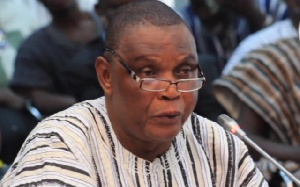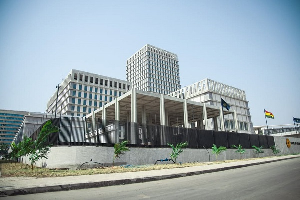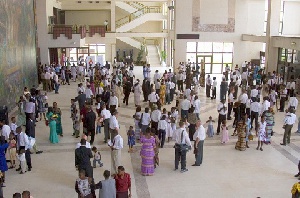Dr Gyieli Nurah, the Minister of State at the Presidency in-Charge of Food and Agriculture, has said Government was willing to obtain feedbacks from stakeholders and citizens to help in successful implementation of its flagship programmes.
He said these feedbacks would help give new ideas to government on how to improve on the efficiency and effectiveness of its flagship programmes to help achieve its vision of a Ghana beyond Aid.
He said this on Wednesday in Tamale, during the opening ceremony of the eighth Annual Pre-harvest Agribusiness Exhibition and Conference event, under the theme: "Agribusiness in the Northern Region, the Future starts now".
The event was organized by Agrihouse Foundation in partnership with the World Food Programme, USAID ADVANCE, Ministry of Food and Agriculture, the Northern Development Authority (NDA) and other private and international organisations as well as various stakeholders, farmers and farmer groups in the north.
The three-day event, sought to create a dynamic platform for commodities buyers and farmers to establish business relationships and discuss contracts for the harvest of their produce to promote growth in Ghana's agricultural sector.
Dr Nurah said for instance, the Planting for Food and Jobs (PFJ) programme was one of the flagship programmes for agriculture and agribusiness, aimed at modernizing the agricultural sector to help transform the nation's economy.
He said the PFJ programme was complemented by government's other flagship programmes in particular the Infrastructure for Poverty Eradication Program( IPEP ), One District One Factory (1D1F) and National Enterpreneurship Innovation Program (NEIP), with each of these programmes having significant agribusiness elements for development .
Dr Nurah said the implementation of the IPEP had began with the establishment of the three development authorities with its heads of managements, to manage resources for development and also obtain feedbacks from citizens and serve as a paradigm shift in government's approach to sustainable development especially at the grassroots levels in the country.
He said the government also believed firmly in Public-Private partnership to help grow the economy and increase business and job opportunities for all Ghanaians especially the youth.
Madam Alberta Nana Akyaa Akosa , Executive Director of Agrihouse Foundation, said the Pre-harvest event was to present realistic opportunities for various value chain actors to meet, discuss business and work together to ensure that enough produce was available for local consumption and exports by mitigating the risk associated with excessive importation.
She said participants would be taken through practical and engaging session to enable them gain deeper insight into best practices as well as how to take full advantage of numerous opportunities in the agricultural sector.
Madam Akyea said the Agrihouse Foundation believed in the capacity of women in agriculture since they contributed to about 70 per cent of food produced in the country and called on government to pay serious attention to women in agriculture to help bridge the gap that existed between them and their male counterparts.
Madam Heather Cameron, the Canadian High Commissioner to Ghana, said Canada had the vision of supporting the government of Ghana to improve on its agricultural sector and through their partnership with WFP, more than 5,000 farmers had been helped to increase their productivity, raise revenues from the sale of their produce as well as connect with marketers within the agricultural value chains.
She urged all the financial institutions present to help continue in providing support to the smallholder farmers and entrepreneurs to improve on and strengthen their businesses.
Mr Ron Strikker, the Netherlands Ambassador to Ghana commended female farmers for their efforts in contributing to most of the agriculture in the country.
He said the north had the potential of being the bread basket of food in the country, and urged all farmers to continue to give out their best because the sector had vast arable land, source of water for irrigation, animal production among others.
Mr Strikker, however, called on stakeholders and traditional leaders to help stop the falling of trees and bushfires to preserve the rich fertile soil and the vegetation to improve on crop yield.
Ms Rukia Yacoub, the Country representative of the World Food Programme (WFP) acknowledged the government of Canada for its partnership and continued funding, which had allowed WFP in Ghana to embark on a new chapter of innovative, integrated food security and nutrition programmes and had helped improve on food production in Ghana.
She said the innovative programmes, which was centred on Ghanaian owned industrial agro-processes; assisted farmers across the country with funding to enable them produce specialised fortified nutritious food of international standards and made available some of the produce on the Ghanaian markets to prevent malnutrition.
Ms Yacoub said over 10,000 smallholder farmers in the Upper East, Upper West, Ashanti and Brong Ahafo Regions have been identified and linked to these agro-processes as the market for their produce and some of the lead farmers were going to participate in the three days event.
Mr Salifu Saeed, the Northern Regional Minister challenged all investors to continue to support farmers within the northern zone with logistics and farm inputs to help facilitate agricultural production and eradicate poverty in the zone.
He urged the youth to take advantage of the ongoing initiative and venture into agriculture to help ensure that the northern sector produces enough food to feed the zone and the country as a whole.
Regional News of Thursday, 4 October 2018
Source: ghananewsagency.org













